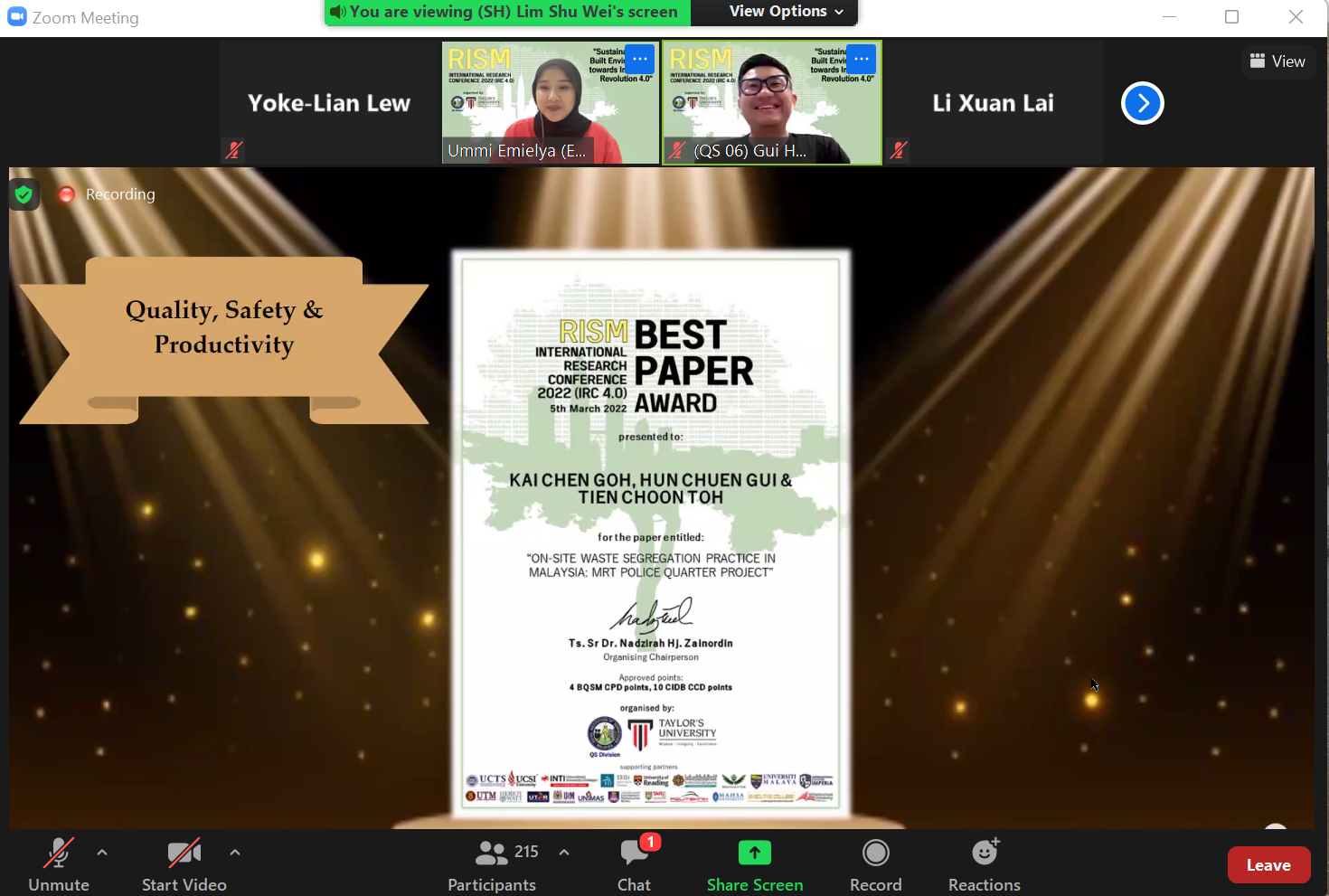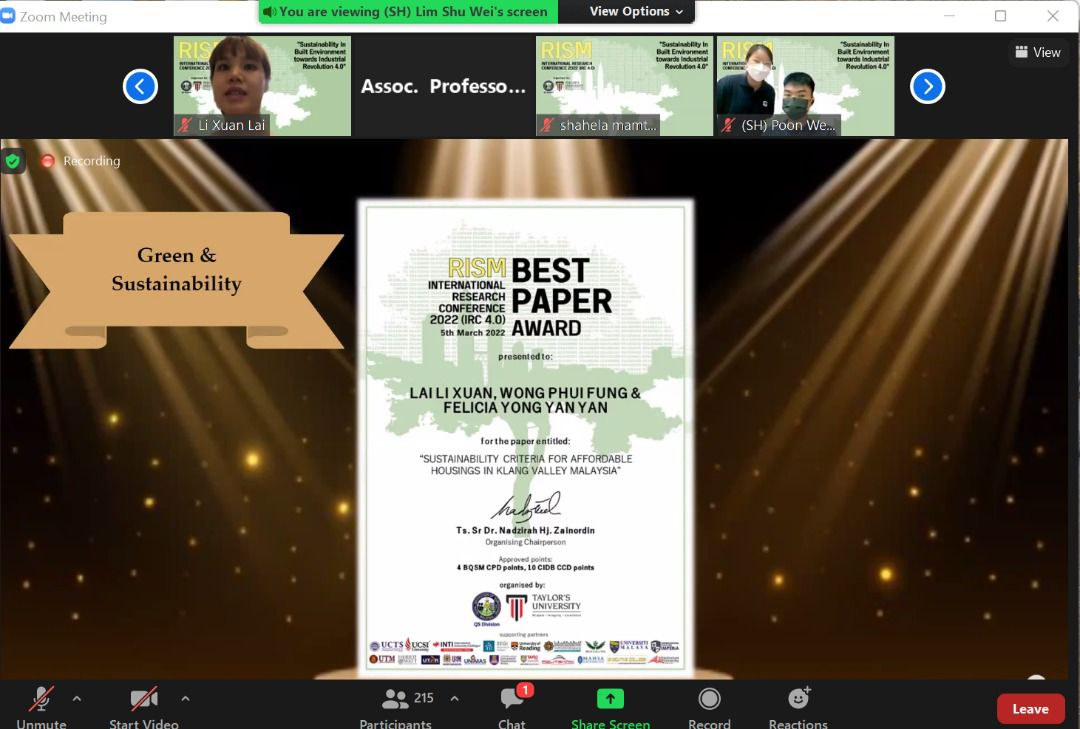
Researchers from Lee Kong Chian Faculty of Engineering and Science (LKC FES) were awarded the Best Paper Award for their researches titled Sustainability Criteria for Affordable Housings in Klang Valley Malaysia, and On-site Waste Segregation Practice in Malaysia: MRT Police Quarter Project, when they participated in the Royal Institution of Surveyors Malaysia International Research Conference (RISM IRC) 2022 4.0 virtually on 5 March 2022. It was jointly organised by RISM and Taylor’s University.
The international conference highlighted Sustainability in Built Environment towards Industrial Revolution 4.0, with discussions and presentations that further highlighted sub-themes, including Innovation, Technology and Engineering; Green and Sustainability; Quality, Safety, and Productivity; Professional Practice and Management; and Education.

Organiser announcing Dr Toh and his team as the winners of the Best Paper Award
The “On-site Waste Segregation Practice in Malaysia: MRT Police Quarter Project” research was co-authored by Ts Dr Toh Tien Choon, Goh Kai Chen, and Gui Hun Chuen. The team won under the sub-theme— Quality, Safety and Productivity.

Organisers making an official announcement of Lai’s research winning the Best Paper Award
The “Sustainability Criteria for Affordable Housings in Klang Valley Malaysia” was authored by Master of Engineering Science student Lai Li Xuan, with supervisors Sr Dr Wong Phui Fung and Department of Surveying Head Dr Felicia Yong Yan Yan.
Lai enthused, “I was delighted because it was something I hadn’t expected. I felt honoured to have been chosen from among so many deserving and capable participants. It is undoubtedly a significant honour, and I am humbled to have my efforts recognised by the panels. My supervisors, parents, and friends deserve a shout-out for their unending encouragement and support, and I’d like to express my gratitude to them.”
Lai’s research mentioned that housing affordability and sustainability is a global concern around the world including Malaysia. Sustainable development is a multifaceted process integrating environmental protection with economic, social, and cultural development. Yet, most affordable housing policies in developing countries failed to address the three sustainability pillars. The affordable housing scheme, PR1MA, could not meet homebuyers’ needs, resulting in a low take-up rate. Meanwhile, the Malaysian government has recommended including innovative technologies and sustainability features in Malaysian social housing to improve inhabitants’ living quality. Hence, this research aims to analyse the sustainability criteria for affordable housing based on the homebuyers’ perspective. The criteria contributing to sustainability in affordable housing were categorised into the environment, economic, social and technological criteria. A questionnaire was designed and distributed to B40 and M40 homebuyers in the Klang Valley. The data obtained were analysed using Arithmetic Mean, Mann-Whitney U Test and Kruskal-Wallis Test to identify the differences between each demographic group on sustainability criteria. This study concluded economic sustainability is essential in sustainable and affordable housing development from the homebuyers’ perspective. Results also revealed that homebuyers with different demographic backgrounds have different preferences on sustainability criteria when purchasing affordable housings. The findings could guide future affordable housing policies to meet homebuyers’ requirements to address property overhang and affordability issues. The research complies with the United Nations Sustainable Development Goal 11 to ensure citizens’ access to adequate and affordable housing in sustainable cities and communities.
Lai further explained, “The research is related to the Sustainable Development Goal 11, to make cities and human settlements inclusive, safe, resilient and sustainable. When affordable housings are built sustainably, it could harmonise economic, social and cultural equity with environmental sustainability in order to create more liveable cities. It could also effectively reduce slum dwellers and could adequately address issues like climate change, and economic and human development. By focusing on sustainability, the housing development industry becomes more cost-effective, environmentally friendly, and socially responsible. A detailed grasp of the homebuyers’ perceptions of their ideal sustainable affordable housing is provided in the findings. Policymakers could use it as a planning tool in delivering better quality and affordable housings to the needy.”
© 2022 UNIVERSITI TUNKU ABDUL RAHMAN DU012(A).
Wholly owned by UTAR Education Foundation (200201010564(578227-M)) LEGAL STATEMENT TERM OF USAGE PRIVACY NOTICE